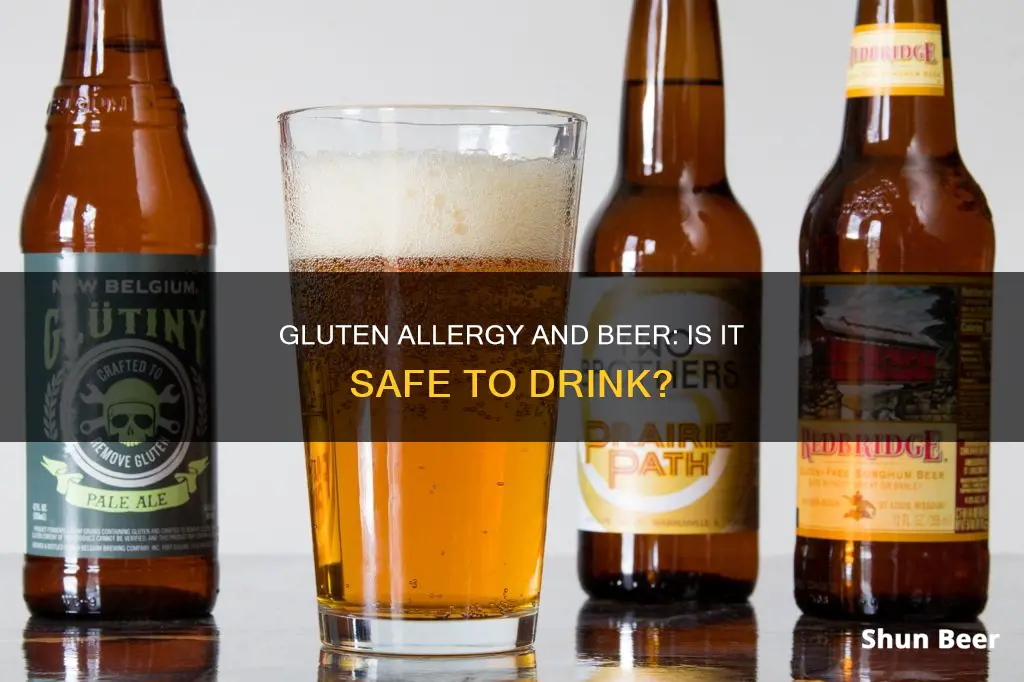
Beer is traditionally made with barley, hops, yeast, and sometimes wheat. As barley and wheat contain gluten, beers made from either are not gluten-free. However, gluten-free beers are available and are made with alternative grains such as millet or buckwheat, or brewed with an enzyme to reduce the gluten content. If you have a gluten allergy, sensitivity, or celiac disease, you must follow a gluten-free diet to prevent symptoms.
What You'll Learn

Beer is not gluten-free
If you have a gluten allergy, sensitivity, or celiac disease, you must follow a gluten-free diet to prevent symptoms. Celiac disease is an autoimmune disorder triggered when you eat or drink things that contain gluten. The gluten causes your body to attack and damage your digestive tract, which can lead to absorption issues and malnutrition. Gluten sensitivity can cause similar symptoms to celiac disease, but without damage to the intestinal tract.
Regular beer is not recommended for people who are on a gluten-free diet. However, there are gluten-free beers available, which are made with alternative grains such as millet or buckwheat, or brewed with an enzyme to reduce the gluten content. Gluten-free beers often cost more than regular beers due to the alternative grains and adaptations required in the brewing process. They may also taste slightly different, with some being sweeter or less carbonated than regular beers.
If you are gluten intolerant, it is important to read labels carefully when purchasing beer or cider. If the gluten content is unclear, ask the manufacturer. It is also recommended to drink in moderation, with a limit of 12 ounces a day for women and 24 ounces a day for men.
A Beer Lover's Guide to Mohegan Sun Fest
You may want to see also

Gluten-free beers are available
If you have a gluten allergy, sensitivity, or celiac disease, you must follow a gluten-free diet to prevent symptoms. This means saying goodbye to traditional beers, which are typically made with wheat, rye, or barley—all of which contain gluten. However, this doesn't mean you have to give up beer altogether. Gluten-free beers are available and are becoming increasingly popular.
Gluten-free beers are made with gluten-free grains like sorghum, rice, millet, buckwheat, or corn instead of wheat or barley. They are regulated by the Food and Drug Administration (FDA) and must contain less than 20 parts per million (ppm) of gluten.
- Buck Wild Pale Ale by Alpenglow Beer Company (California, USA)
- Copperhead Copper Ale by Alt Brew (Wisconsin, USA)
- Redbridge Lager by Anheuser-Busch (Missouri, USA)
- Felix Pilsner by Bierly Brewing (Oregon, USA)
- Pyro American Pale Ale by Burning Brothers Brewing (Minnesota, USA)
- Third Contact IPA by Divine Science Brewing (California, USA)
- Celia Saison by Ipswich Ale Brewery (Massachusetts, USA)
- G-Free (Pilsner) by St. Peter's Brewery (Bungay, UK)
- Forager Amber Pale Ale by Whistler Brewing Company (British Columbia, Canada)
Dedicated gluten-free breweries take extra care to prevent cross-contamination with gluten-containing beers, so you can be sure your beer is truly gluten-free.
If you're feeling adventurous, you can even try brewing your own gluten-free beer at home. Homebrew kits are available, and the process is similar to brewing traditional beer, but with gluten-free ingredients.
So, if you're craving a cold beer but need to stick to a gluten-free diet, you have options! Just be sure to read labels carefully and choose beers made with gluten-free grains and produced in dedicated gluten-free facilities.
Beer and Running: What's the Deal?
You may want to see also

Beer allergy symptoms
Beer allergies are rare, and you may have an intolerance to beer or one of its ingredients instead. However, if you are allergic to beer, you will likely experience symptoms similar to those of other allergic reactions.
If you are allergic to beer, you may experience symptoms such as:
- Abdominal pain and bloating
- Chest tightness
- Hives
- Wheezing
- Chest pain
These symptoms may occur almost immediately after consuming beer, and they can be severe and life-threatening. If you experience any of these symptoms, seek immediate medical attention.
Beer Intolerance Symptoms
If you have a beer intolerance, your symptoms are likely to be milder and may include:
- Sneezing
- Mild abdominal pain and bloating
- Mild chest tightness
Diagnosing Beer Allergies and Intolerances
The best way to determine if you have a beer allergy or intolerance is to visit an allergist who can perform specific allergy tests, such as a skin prick test or an elimination diet.
Treatment
The only way to avoid beer allergy or intolerance symptoms is to avoid drinking beer or choose beers that do not contain the ingredient(s) causing your symptoms.
Beer Traps: Effective Snail Control or Urban Myth?
You may want to see also

Beer allergy vs. intolerance
Beer allergies are rare, and the many ingredients in beer make an allergy to a specific ingredient more likely. Beer allergy symptoms are often caused by an allergy to beer ingredients like wheat, yeast, sulfites, and histamine. Beer allergies are an immune response.
If you break out in a rash or have gastrointestinal issues after drinking beer, you may have an alcohol intolerance. Alcohol intolerance is a genetic condition in which the body cannot break down alcohol efficiently. Alcohol intolerance is a digestive response.
Beer Allergy Symptoms
People with a beer allergy are likely to experience common food allergy symptoms, such as:
- Diarrhea
- Heartburn
- Anaphylaxis (rare but severe allergic reaction)
- Shortness of breath
- Swelling of the throat or tongue
- Loss of consciousness
Alcohol Intolerance Symptoms
The most common signs and symptoms of alcohol intolerance are:
- Stuffy nose
- Skin flushing
- Facial redness
- Red, itchy skin bumps (hives)
- Worsening of pre-existing asthma
Diagnosis
To diagnose a beer allergy or intolerance, a healthcare provider will perform a physical exam and discuss your medical history and symptoms. They may also recommend a skin test or blood test for food allergies.
Treatment
The only way to avoid beer allergy symptoms is to avoid drinking beer or choose beers that do not contain the ingredient causing the symptoms. For example, people with a gluten allergy can choose gluten-free beer. The only way to prevent alcohol intolerance symptoms is to avoid alcohol.
Enjoying Beer at VA Beach: What You Need to Know
You may want to see also

Celiac disease and non-celiac gluten sensitivity
Celiac disease is an autoimmune disorder that affects the small intestine when gluten is ingested. It is not a food sensitivity or an allergy, but an immune response that causes the body to attack the lining of the small intestine. This inhibits the body's ability to absorb nutrients from food, causing nutritional deficiencies. Celiac disease is a serious condition that can lead to malnutrition and other health issues, including anaemia, osteoporosis, neurological conditions, and cancer. It is estimated to affect 1% of the population in Europe and North America, with a 10% chance of developing the disease if a first-degree relative has it.
The only treatment for celiac disease is a strict, lifelong gluten-free diet. People with celiac disease must avoid foods containing wheat, rye, and barley, such as bread and beer. Even small amounts of gluten can trigger damage to the small intestine. A gluten-free diet allows the intestine to heal and regain its ability to absorb nutrients.
Non-celiac gluten sensitivity (NCGS) is a separate condition where individuals experience symptoms similar to those with celiac disease but without the same immune response or intestinal damage. NCGS is a type of food intolerance, which is different from a food allergy. Food intolerances are a digestive response, whereas food allergies are an immune response. While the symptoms of NCGS may be similar to celiac disease, they are generally milder and do not cause long-term damage to the intestines.
Beer is typically made with barley or rye and, therefore, contains gluten. For those with celiac disease or non-celiac gluten sensitivity, drinking beer can trigger symptoms. However, there are now gluten-free beers available, which are made with gluten-free grains such as sorghum, rice, or buckwheat. These beers are safe for people with gluten intolerance to consume.
Coffee and Beer: A Match Made in Heaven?
You may want to see also
Frequently asked questions
No, regular beer is not gluten-free and should be avoided by people with a gluten allergy. Beer is typically made from barley, hops, yeast, and sometimes wheat, all of which contain gluten.
Gluten-free beers are available and are made with alternative grains such as millet, buckwheat, or sorghum. These beers are brewed with an enzyme to help reduce the amount of gluten in the final product.
Symptoms of a gluten allergy or gluten intolerance include stomach pain, difficulty concentrating, and headaches. In the case of celiac disease, a person's body triggers inflammation in their small intestine when they eat gluten, which over time can lead to absorption issues and malnutrition.
Other gluten-free drinks include wine, pure distilled liquors, and hard ciders, although some ciders may contain barley so it is important to read the ingredients list.
A food allergy is an immune system response to a food protein that the body sees as harmful. A food intolerance, on the other hand, is a digestive response and is not mediated by the immune system protein IgE.







